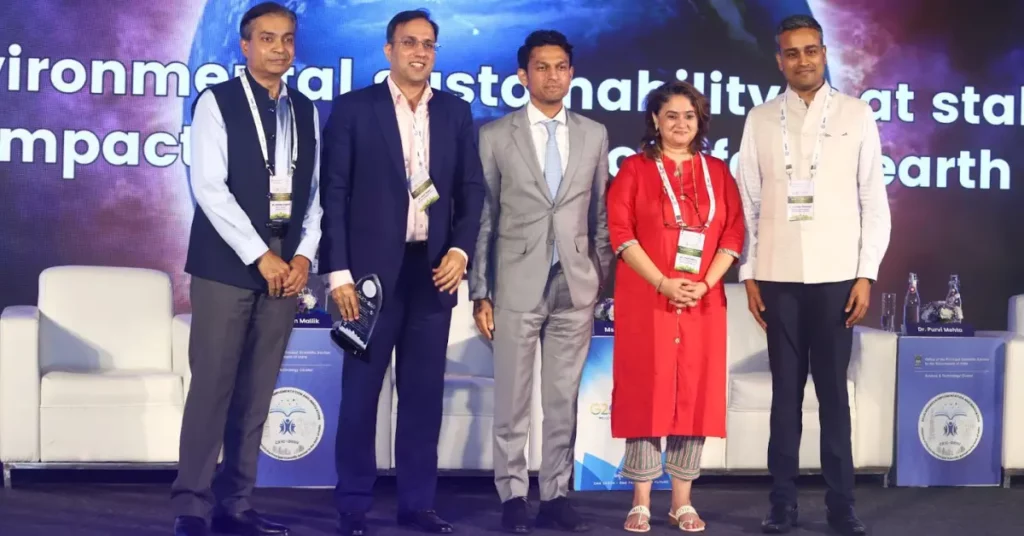4 minutes read
Climate change is no longer a distant threat; it is a rapidly unfolding crisis with profound implications for human health. The altered climate patterns, rising temperatures, and extreme weather events associated with climate change are significantly impacting health outcomes worldwide, particularly through disruptions to food systems. As the planet warms, these interconnected challenges are becoming increasingly complex, necessitating data-driven solutions for effective mitigation.
To shed light on the intersection of these critical domains, a panel discussion titled “Role of scientific data in institutionalising financing for Climate and Health Action” was held at “G20 India: Chief Scientific Advisors’ Roundtable” organised by CKIC-DRIIV: Delhi Research Implementation and Innovation team in New Delhi. The panel constituted Arjun Mallik, Prudential India; Purvi Mehta, BMGF; Sandeep Singhal, ACT Grants and Avaana Capital; Shefali Misra, Biocon; and Sunil Thakur, Quadria Capital with Aravindan Srinivasan, AVPN as moderator.
The session delved into three key areas:
1. Role of climate-related scientific data and research in enhancing healthcare and climate change initiatives across the global South
Climate-related scientific data and research play a pivotal role in advancing both healthcare and climate change initiatives. Precise climate data builds the understanding of health risks posed by changing environmental conditions, aiding in the development of adaptive strategies. Research provides insights into the links between climate change and health, helping shape policies and interventions.
One of the areas where data plays a pivotal role is the impact of climate on health outcomes via food systems. Purvi Mehta of the Bill and Melinda Gates Foundation emphasised that the initial and most pronounced impact of climate change on the planet is its detrimental effect on food systems. This issue is closely intertwined with livelihood concerns, particularly for numerous nations in the global south, where a significant portion of the population relies on income generated from agricultural activities.
To address the above, precise climate data can help in predicting shifts in growing conditions and identifying regions at risk of crop failures, allowing for targeted interventions and adaptive agricultural practices. Additionally, nutritional analyses of crops can aid in gauging potential deficiencies and devising strategies to promote diverse and nutritious diets.
2. How evidence continues to be leveraged by private investors to invest in climate action and health
Evidence holds paramount importance for private investors considering investments in climate action and health. Concrete data substantiates the financial viability of initiatives targeting these sectors, bolstering investor confidence. Clear evidence showcases the correlation between climate change, health outcomes, and business opportunities enabling informed decision-making and compelling private investors to engage in climate action and health investments. For instance, Arjun Malik from Prudential India shared how they are funding research, studying air quality’s health effects to guide effective business decisions and also their corporate foundation’s strategy. Sunil Thakur of Quadria Capital informed that they evaluate their engagement with portfolio companies based on ESG criteria while integrating climate indicators into the ESG framework. Shefali Misra from Biocon highlighted the role of robust sustainable practices and compliances in capitalising on business opportunities. She stated that the pandemic illustrated how businesses with robust sustainability practices displayed greater resilience.
It is clear from the discussions that, by leveraging evidence, investors are not only driving positive environmental and health impacts but also capitalising on lucrative opportunities aligned with global sustainability goals.
3. What data is needed to make evidence-based decisions in institutionalising intersectional financing
Data is critical for informed, evidence-based decisions in institutionalising intersectional financing. It provides a clear lens into the complex dynamics of overlapping inequalities and disparities faced by marginalised groups. By analysing intersecting factors such as gender, race, and socio-economic status, data empowers stakeholders to allocate resources effectively, ensuring that interventions address root causes and maximise impact. This was also echoed by Arjun Malik from Prudential India in the discussion, “We must bolster community resilience and leverage data-driven platforms. As insurers, we can nudge change by considering climate risks, prudent underwriting, and sustainable investments”.
Creating data commons as public goods came out as a critical need for making evidence-based impactful decisions. Many transformative initiatives demand a digital commons as public goods. Collaborative platforms and shared resources have the potential to fast-track the development of these vital tools, particularly if we dismantle the barriers between various sectors. By providing seed funding and support, philanthropic organisations can facilitate the establishment and maintenance of open-access platforms that enable the sharing and utilisation of data across various sectors as pointed out by Sandeep Singhal from ACT Grants.
By leveraging scientific evidence and fostering cross-sectoral partnerships, transformative change is within reach, charting a path toward a greener and healthier future. Wth concerted efforts, private investment can be a powerful catalyst for achieving equitable, healthy, and sustainable outcomes for both people and the planet.
We at AVPN strive to increase the flow of financial, human and intellectual capital to the climate and health nexus by connecting and empowering key stakeholders who are working towards achieving SDGs across Asia. We are catalysing the movement towards a more strategic, collaborative and outcome-focused approach to social investing in Asia, ensuring that resources are deployed as effectively as possible. As COP28 comes closer this year, we are gearing up to engage our members and other partners to create new financing models which will be catalytic for longer-term investments into the climate-health nexus.


















